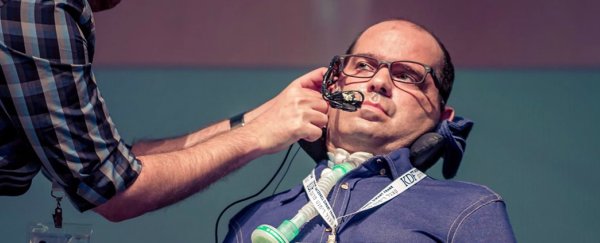ALS (amyotrophic lateral sclerosis) is the neurodegenerative disease that can leave sufferers completely immobilised, and inspired the ice bucket challenges that took over social media last year. Now an innovative new device could make a real difference for ALS patients by helping these 'locked-in' individuals communicate using nothing but their eye movements.
The EyeControl gadget isn't a completely original idea, but it sets new standards in terms of cost, ease-of-use and portability. Right now, most existing solutions require patients to sit in front of a computer display, similar to the system that Stephen Hawking uses. But the team behind the device has now shrunk that computer down to the size of a chip, so that people with ALS can 'speak' using their eye movements no matter where they are - for example, from bed, or when travelling in a car.
They already have a working prototype and are now seeking $30,000 through an Indiegogo campaign to bring EyeControl technology to the masses.
The kit comprises a head-mounted camera with an infrared sensor that tracks eye movements, together with a small microcomputer called Odroid. It's the Odroid that converts eye activity into speech, and it gradually becomes tailored to a specific patient's needs and habits. Output can be sent to headphones, speakers or a smartphone.
With the EyeControl device, users can send an emergency alert, pick from a list of preset phrases (such as "I'm too hot") or compose specific words and sentences a letter at a time. From responding to questions to composing a novel, the new gadget has the potential to substantially improve the quality of life for people affected by ALS (also known as Lou Gehrig's disease and Charcot disease).
The makers of the EyeControl system say 7 out of 10 ALS sufferers are priced out of this kind of technology, with existing devices costing in the region of $5,000. They believe they can bring the EyeControl to market for just 5 percent of that price, which would bring an affordable communication option to just about anyone who wants it.
There's still work to do though: a pilot scheme is planned where beta testers can provide feedback and suggest improvements for EyeControl, and both the eye-tracking algorithm and the associated app are going to be developed further before the gadget is available.
"People with ALS will no longer need to pay a high amount of money to have a voice," says Or Retzkin, the Project Lead. "Every member of our team has a family member or friend living with ALS. A year ago we decided to create a portable and affordable communication solution for 'locked-in' people and today we are proud to present EyeControl to the Indiegogo community."
